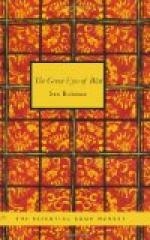“Is that all you know of the matter?” I asked.
“No,” answered Martin, “it ain’t. Tell him, Hawkins.”
“Aye,” resumed Hawkins, “he might as well know, as he’s livin’ here. Well, sir, young Mr. Edward he’s very quiet about what happened to him. Maybe we shouldn’t have thought so much about it like if it hadn’t been that in this very bar, six months ago, he’d plagued the life out of young Harry Adams.”
“For what reason?” I asked idly; the conversation was beginning to bore me. But:
“Young Harry Adams,” explained Hawkins with gusto, and his former wicked look returning to his eyes, “at one time was Mr. Edward’s only rival with the gals, he was. A good-lookin’ young fellow; got a commission in the war he did. He’s up to London now. Well, six months ago young Harry Adams come staggerin’ in here one night with blood runnin’ from his face and neck. He fell down in that seat where you’re sitting now and fainted right off, didn’t he, Martin? We had to send young Jim Corder (what used to come here in them days) off runnin’ all the way past Leeways for the doctor. Ah, that were a night.”
“It were,” agreed Martin.
“Same as Mr. Edward,” continued the narrator, “young Harry Adams wouldn’t say a word about what happened to him. But when Mr. Edward first see him, all over sticking-plaster, he laughed till the pots nearly fell off the hooks, he did. Little did he guess his own turn was to come!”
My interest revived.
“Then in the case of, er—Mr. Adams,” I said, “you never had any particulars whatever?”
“Never,” replied Martin. “Time, please, gentlemen.”
“Aye,” said Hawkins, rising. “Time it be. Well, good night, sir. Good night, Martin.”
“Good night.”
Hawkins moved towards the door, and indeed was on the point of going out when I remembered something which I had meant to ask earlier, but which, owing to lack of opportunity, I had postponed asking.
“You spoke of a gift or keepsake, which the lady from London gave to Mr. Hines,” I said. “I think you mentioned that he had shown it to you. I am rather curious about this story. Might I ask the nature of the gift?”
“Aye, to be sure,” answered Hawkins, standing half in shadow on the step of the bar-parlor, rifle on shoulder, where I thought he made a very wild figure. “Brought it here, he did. All of us see it. That stuck up about it, he was. Not as I should have thought much of it if a party had give it to me, I do say.”
“Then what was it?”
“Why—it were a little figure like—gold he said it were, but brass I reckon. Ugly it were, but he says he’s goin’ to wear it on his watch-chain. Good night, sir.”
He turned and departed, but:
“What kind of figure?” I called after him.
Out of the darkness his voice came back:
“A sort of a cat, sir.”




